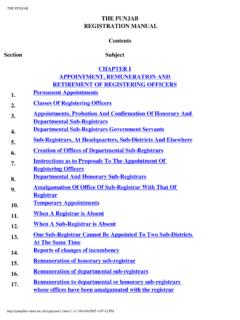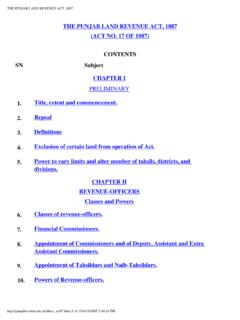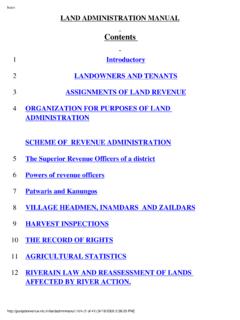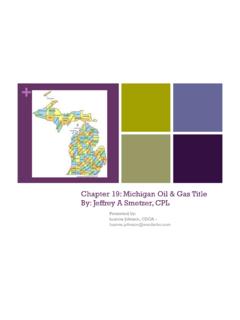Transcription of CHAPTER 1 PRELIMINARY CHAPTER II INTESTATE …
1 Hindu succession Act 1956 HINDU succession ACT, 1956[ 30 of 1956, dt. 17-6-1956] An Act to amend and codify the law relating to INTESTATE succession among it enacted by Parliament in the Seventh Year of the Republic of India as follows:- CHAPTER 1 PRELIMINARY1 Short title and extent 2 Application of Act 3 Definitions and Interpretations 4 Overriding effect of Act CHAPTER IIINTESTATE succession GENERAL5 Act not to apply to certain properties6 Devolution of interest of coparcenary property7 Devolution of interest in property of a Tarwad, Tavazhi, Kutumba, kavaru or IIIom8 General rules of succession in the case of males9 Order of succession among heirs in the Schedule10 Distribution of property among heirs in class I of the Schedule11 Distribution of property among heirs in class II of the Schedule12 Order of succession among agnates and cognates13 Computation of degrees14 Property of a female Hindu to be her absolute property15 General rule of succession in the case of female Hindus16 Order of succession and manner of distribution among heirs of a female (1).
2 Htm (1 of 24)4/16/2005 4:45:51 PMHindu succession Act 195617 Special provision respecting person governed by Marumakkattayam and Aliyasantana laws18 Full blood preferred to half blood19 Mode of succession of two or more heirs20 Right of child in womb21 Presumption in cases of simultaneous deaths22 Preferential right to acquire property in certain cases23 Special provision respecting dwelling houses24 Certain widow remarrying may not inherit as widows25 Murderer disqualified26 Convert s descendants disqualified27 succession when heir disqualified28 Disease, defect, etc. not to disqualify29 Failure of heirsCHAPTER IIITESTAMENTARY SUCCESSION30 Testamentary successionCHAPTER IVREPEAL31 Repeal32 THE SCHEDULE-Heirs in Class I and Class II HINDU succession ACT,1956 CHAPTER IPRELIMINARY 1.
3 Short title and (1).htm (2 of 24)4/16/2005 4:45:51 PMHindu succession Act 1956 (1) This Act may be called the Hindu succession Act, 1956. (2) It extends to the whole of India except the State of Jammu and Application of Act (1) This Act applies-(a) to any person, who is a Hindu by religion in any of its forms or developments including a Virashaiva, a Lingayat or follower of the Brahmo, Prarthana or Arya Samaj;(b) to any person who is Buddhist, Jaina or Sikh by religion; and(c) to any other person who is not a Muslim, Christian, Parsi or Jew by religion unless it is proved that any such person would not have been governed by the Hindu Law or by any custom or usage as part of that law in respect of any of the matters dealt with herein if this Act had not been passed. Explanation: The following persons are Hindus, Buddhists, Jainas or Sikhs by religion, as the case may be:-(a) any child, legitimate or illegitimate, one of whose parents are Hindus, Buddhists, Jainas or Sikhs by religion;(b) any child, legitimate or illegitimate, one of whose parents is a Hindu, Buddhist, Jaina or Sikh by religion and who is brought up as a member of the tribe, community, group or family to which such parent belongs or belonged;(c) any person who is convert or re-convert to the Hindu, Buddhist, Jaina or Sikh religion.
4 (2) Notwithstanding anything contained in sub-section (1) nothing contained in this Act shall apply to the members of any Scheduled Tribe within the meaning of clause (25) of article 366 of the Constitution unless the Central Government, by notification in the Official Gazette, otherwise directs.(3) The expression "Hindu" in any portion of this Act shall be construed as if it included a person who, though not a Hindu by religion, is, nevertheless, a person to whom this Act applies by virtue of the provisions contained in this section. 3. Definitions and interpretations (1) In this Act, unless the context otherwise requires-(a) "agnate"- one person is said to be an "agnate" of another if the two are (1).htm (3 of 24)4/16/2005 4:45:51 PMHindu succession Act 1956related by blood or adoption wholly through males;(b) "Aliyasantana law" means the system of law applicable to persons who, if this Act had not been passed, would have been governed by the Madras Aliyasantana Act, 1949, or by the customary Aliyasantana law with respect to the matters for which provision is made in this Act;(c) "cognate"-one person is said to be a cognate of another if the two are related by blood or adoption but not wholly through males.
5 (d) the expressions "custom and "usage" signify any rule which having been continuously and uniformly observed for a long time, has obtained the force of law among Hindus in any local area, tribe, community, group or family:PROVIDED that the rule is certain and not unreasonable or opposed to public policy:PROVIDED FURTHER that in case of a rule applicable only to a family it has not been discontinued by the family; (e) "full blood", "half blood" and "uterine blood"-(i) two persons said to be related to each other by full blood when they are descended from a common ancestor by the same wife, and by half blood when they are descended from a common ancestor but by different wives;(ii) two persons are said to be related to each other by uterine blood when they are descended from a common ancestress but by different husbands; Explanation: In this clause "ancestor" includes the father and "ancestress" the mother, (f) "heir" means any person, male or female, who is entitled to succeed to the property of an INTESTATE under this Act; (g) " INTESTATE " a person is deemed to die INTESTATE in respect of property of which he or she has not made a testamentary disposition capable of taking effect; (h) "marumakkattayam law" means the system of law applicable to persons- (1).
6 Htm (4 of 24)4/16/2005 4:45:51 PMHindu succession Act 1956(a) who, if this Act had not been passed, would have been governed by the Madras Marumakkattayam Act, 1932; the Travancore Nayar Act; the Travancore Ezhava Act; the Travancore Nanjinad Vellala Act; the Travancore Kshatriya Act, the Travancore Krishnanvaka Marumakkathayyee Acr; the Cochin Marumakkathayam Act; or the Cochin Nayar Act with respect to the matters for which provision is made in this Act; or(b) who belong to any community, the members of which are largely domiciled in the State of Travancore - Cochin or Madras [1][as it existed immediately before the Ist November, 1956,] and who, if this Act had not been passed, would have been governed with respect to the matters for which provision is made in this Act by any system of inheritance in which descent is traced through the female line; but does not include the Aliyasantana law;(i) "Nambudri law" means the system of law applicable to persons who if this Act had not been passed, would have been governed by the Madras Nambudri Act, 1932; the Cochin Nambudri Act; or the Travancore Malayala Brahmin Act with respect to the matters for which provision is made in this Act ; (j) "related " means related by legitimate kinship: PROVIDED that illegitimate children shall be deemed to be related to their mother and to one another, and their legitimate descendants shall be deemed to be related to them and to one another; and any word expressing relationship or denoting a relative shall be construed accordingly.
7 (2) In this Act, unless the context otherwise requires, words imparting the masculine gender shall not be taken to include females. 4. Overriding effect of Act (1) Save as otherwise expressly provided in this Act ,-(a) any text, rule or interpretation of Hindu law or any custom or usage as part of that law in force immediately before the commencement of this Act shall cease to have effect with respect to any matter for which provision is made in this Act; (1).htm (5 of 24)4/16/2005 4:45:51 PMHindu succession Act 1956(b) any other law in force immediately before the commencement of this Act shall cease to apply to Hindus insofar as it is inconsistent with any of the provisions contained in this Act.(2) For the removal of doubts it is hereby declared that nothing contained in this Act shall be deemed to affect the provisions of any law for the time being in force providing for the prevention of fragmentation of agricultural holdings or for the fixation of ceilings or for the devolution of tenancy rights in respect of such holdings.
8 COMMENTS A reading of makes it clear that provision in are to prevail over principles of Hindu law. Applying the principle it comes to conclusion that a son inheriting separate property of his father, separate property of the father is his separate and individual property and not joint family Addl. Commissioner of Income Tax v. Karuppan Chettiar AIR 1979 Mad 1 As per the language of s. 14 of the Hindu succession Act, any property possessed by a female Hindu, shall be held by her as full owner and not as a limited owner. By applying the provisions of of the Hindu Widow's Remarriage Act,1856,a widow cannot be divested of the property as then it would be an inconsistency with the provisions of this 1973 Where the marriage of a widow took place prior to the coming into force of this Act, as because of marriage her rights to property had already been lost ,provisions of this Act did not Prasad v.
9 Usha Bala AIR 1978 Cal. 525 Mode of devolution as laid down under section 36(5) of the Madras Aliyasantana Act has to give a way to what is laid down in of the Hindu succession Act as regard separate property and to (2) where the property is undivided interest- Sundari v. Laxmi AIR 1980 SC 198 Prior to the present Hindu succession Act came into force, there was a custom prevailing in Punjab, disentitling daughters to inherit. But now the legal position different according to which where the last male holder died after the Act, the previous law disentitling the (1).htm (6 of 24)4/16/2005 4:45:51 PMHindu succession Act 1956daughters to succeed, is no more Manshan v. Tejram AIR 1980 SC being only of prospective nature so where the heir is not a limited owner, this Act would in no way affect his succession ; but it is essential that succession should have taken place prior to the commencement of this v.
10 Hemant Kumar AIR 1985 CHAPTER IIINTESTATE SUCESSIONGENERAL 5. Act not to apply to certain properties This Act shall not apply to - (i) any property succession to which is regulated by the Indian succession Act, 1925 by reason of the provision contained in section 21 of the Special Marriage Act, 1954.(ii) any estate which descends to a single heir by the terms of any covenant or agreement entered into by the Ruler of any Indian State with the Government of India or by the terms of any enactment passed before the commencement of this Act ;(iii) the Valiamma Thampuran Kovilagam Estate and the Palace Fund administered by the Palace Administration Board by reason of the powers conferred by Proclamation (IX of 1124) dated 29th June, 1949, promulgated by the Maharaja of Cochin. COMMENTSW here the son is brought up a Hindu, the Act in no way puts obstacle before the son being treated as member of the Hindu undivided Gandhi v.















